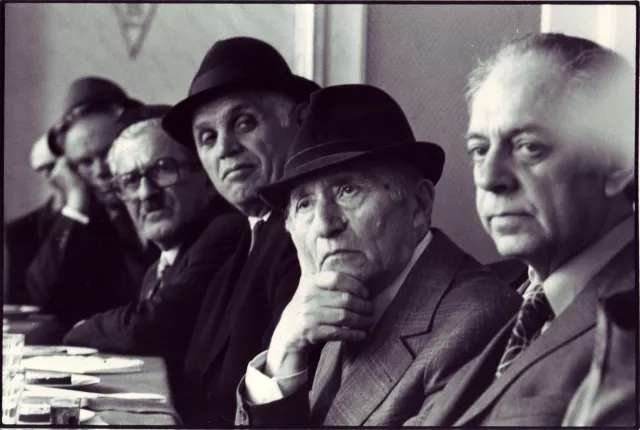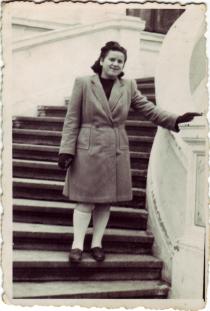From right to left: Iancu Rapaport, my husband Iancu Segal, a gentleman whose name I forgot, then Ioji, Iosif Tierer, who was the president of the Jewish Community in Botosani until 2000 or 2001. He served before Iosif David, the current president. This picture was taken in the 1980’s at the headquarters of the Jewish Community in Botosani.
My husband, Iancu Segal, was born in Stefanesti. My husband came from a family of merchants. But he showed intellectual interests, and in the beginning, I think right after he graduated from high school, before going to the university, he worked as a teacher at the Jewish school in Stefanesti. I don’t know for how long exactly, but he worked as a teacher for quite a few years. Then he attended the Faculty of Mathematics in Iasi. And his father’s financial means were rather limited, but he had wealthy relatives in Iasi, and he lived with his relatives, he too struggled, poor soul. After finishing his studies, he worked as a teacher for mathematics.
But he wanted to become a lawyer, and after World War II he also attended the Faculty of Law in Iasi, but under the under the optional attendance system. He practiced as a lawyer, but only for a very brief period of time, until he saw they dictated him what to say, how to plea; he refused to do so, and he took refuge in the educational system. Back then, they dictated what plea you should make. Every word of it, nothing was tried justly. Which is to say it depended on what the [Communist] party wanted to do: who should be convicted, who shouldn’t be convicted. And he was allowed to plea only to that effect, to observe the indications given by the party. And he was a very just person, he couldn’t take it. And at a certain point, given the fact that he had a degree in mathematics, without saying why he did so, he renounced his law practice and started working in the educational system, and that’s where he worked until his retirement.
After he left the educational system – previously, he was afraid to do so, for they would have kicked him out of the teaching profession – he was an active member at the Jewish Community in Botosani. He was in charge of the talmud torah, the teaching of Hebrew, the teaching of Jewish history, he checked the children – he knew Ivrit better than me, he also went to the yeshivah. There was a certain Stechelberg, who taught the talmud torah, and my husband guided him, for that man wasn’t a teacher of Ivrit. But my husband wasn’t in charge of the synagogue. He didn’t go to the synagogue. He was a religious man by nature, but he couldn’t show it, for he was afraid to do so. He didn’t go to the synagogue, but he helped out at the Community. As he didn’t get to go to the synagogue from the very beginning, he didn’t go there after he retired, either. But he performed the prayers at home every day, in the morning and in the evening. And my father, poor thing, performed the prayer at home as well, for he was afraid, too. It was very strict. On Passover, for instance, my husband – all class masters, not only him – had to accompany his class at a pupils’ ball, so that he couldn’t go to the Resurrection ceremony.
Poor soul, he got bone-cancer in 1986, and he was gone. It was all so sudden. We even went to Bucharest for a medical examination. “No, nothing will help. Nothing will help.”





































